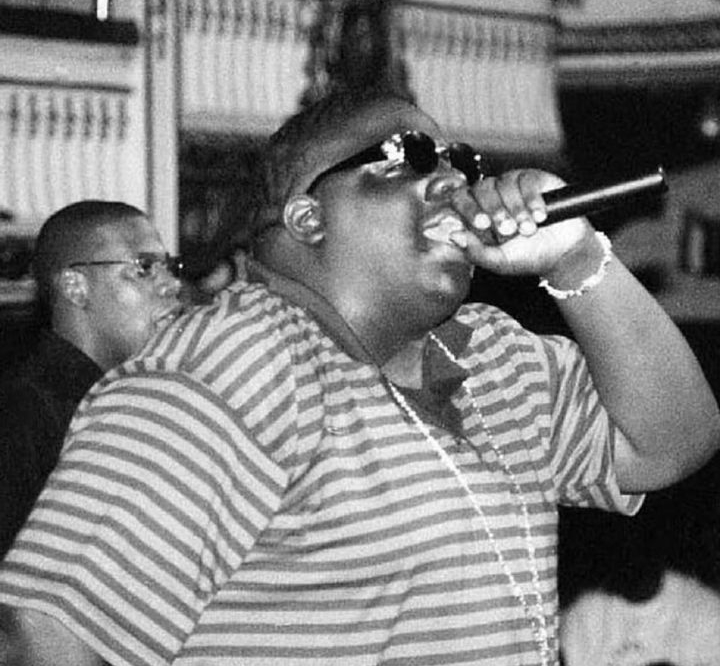Notorious B.I.G
The Notorious B.I.G., also known as Biggie Smalls, is celebrated as one of the most influential rappers in hip-hop history.
With his unique lyrical style, captivating storytelling, and larger-than-life personality, Biggie made an indelible mark on the music industry and pop culture.
This biography delves into the life of this iconic rapper, covering everything from his early beginnings and groundbreaking career to his relationships, legacy, and the tragic circumstances surrounding his untimely death. Discover how his legacy and impact continue to shape music today.
Biography
Christopher George Latore Wallace was born on May 21, 1972, died on March 9, 1997), is professionally known as the Notorious B.I.G. and sometimes referred to as Biggie Smalls or simply Biggie, was a prominent American rapper.
Emerging from New York’s hip-hop scene and influenced by gangsta rap, he is celebrated as one of the greatest rappers in history.
Wallace’s style was marked by his smooth, unhurried flow, contrasting with the dark themes in much of his music.
His songs often drew from his life experiences while he love blending stories of struggle and street life with moments of indulgence and celebration.
The Notorious B.I.G. Wiki
Born Name: Christopher George Latore Wallace
Date of birth: May 21, 1972
Place of birth: Brooklyn, New York City, U.S.
Died: March 9, 1997
Age: 25
Place of death: Los Angeles, California, U.S.
Cause of death: Drive-by homicide (gunshot wound)
Other names: Biggie Smalls, Biggie, Big, Frank White, Big Poppa, MC CWest
Occupations: Rapper, songwriter
Years active: 1992–1997
Spouse: Faith Evans (m. 1994; sep. 1996)
Children: 2, including C. J.
Genres: Hip hop, East Coast hip hop, gangsta rap
Labels: Bad Boy, Atlantic, Arista, Uptown
Instagram: @thenotoriousbig
Net Worth: $160 Million
Born and raised in Brooklyn, New York City, Christopher Wallace became the first artist signed to Sean “Puffy” Combs’s Bad Boy Records in 1993.
That same year, he gained attention for his guest appearances on tracks by other artists. His debut album titled Ready to Die released in 1994, was widely acclaimed and included iconic tracks like “Juicy” and “Big Poppa”.
This release positioned him as a leading figure in East Coast hip-hop, which helps to bring New York back into the spotlight at a time when West Coast rap dominated the scene.
In 1995, Wallace was awarded Rapper of the Year at the Billboard Music Awards. That year (1995), he also introduced his protégés, Junior M.A.F.I.A. a group that included friends like Lil’ Kim through their debut album, Conspiracy in 1995.
In 1996, while working on his second album, Wallace found himself caught in the escalating East Coast–West Coast hip-hop rivalry.
Following Tupac Shakur’s tragic death in a Las Vegas drive-by shooting in September 1996, rumors emerged implicating individuals allegedly tied to Bad Boy Records, due to Wallace’s public disputes with Shakur.
Then, on March 9 in 1997, just six months after Shakur’s death. Wallace himself was killed in a drive-by shooting in Los Angeles, the assailant remaining unidentified.
Two weeks after his death, Wallace’s second album titled Life After Death in 1997, was released as a posthumous double album.
It debuted at the top of the Billboard 200, featured two Hot 100 number-one hits “Hypnotize” and “Mo Money Mo Problems” (with Puff Daddy and Mase) and was later certified diamond by the Recording Industry Association of America (RIAA).
With two posthumous albums, Wallace’s certified U.S. sales have surpassed 28 million copies, including 21 million albums. Rolling Stone has dubbed him the “greatest rapper that ever lived,” while Billboard named him the best rapper of all time in 2015. The Source magazine also recognized him as the greatest rapper in its 150th issue.
MTV ranked him third on their list of The Greatest MCs in 2006, noting him as perhaps the “most skillful ever on the mic.” In 2020, he was inducted into the Rock and Roll Hall of Fame.
Conclusion:
The Notorious B.I.G. remains an enduring icon whose influence resonates far beyond his time. His distinctive flow, gritty lyrics, and authenticity have inspired generations of artists and fans worldwide.
Although his life was cut tragically short, his legacy lives on through his music and the love of his fans.
Biggie’s story is a reminder of the power of resilience, creativity, and the impact that one individual can have on an entire genre. His memory endures, keeping his legacy alive and thriving in the world of hip-hop.
